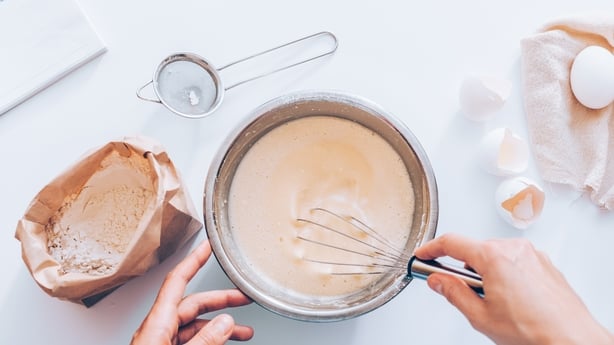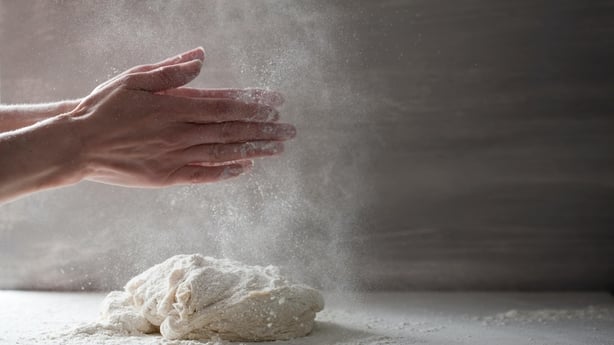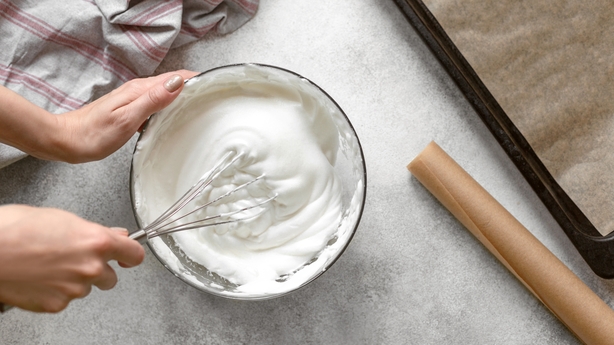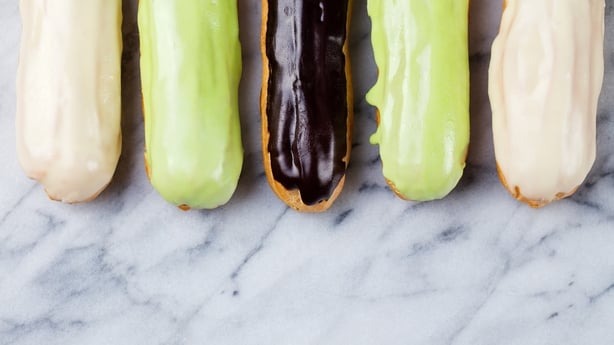Ann Marie Dunne, School of Culinary Arts and Food Technology at the Technological University of Dublin, joined Philip Boucher Hayes, filling in for Claire Byrne, on RTÉ Radio 1 to chat about baking fails and how to fix them. Listen back.
Sometimes, no matter how hard you try, efforts in the kitchen can go deeply awry. From soggy bottoms and burnt edges, baking is an art form that must be approached with care and precision.
To help us get our cakes, buns, and pastries in check, Anne Marie Dunne has shared some top tips to fix our most common mistakes.
Prep work
Problem: Temperature
Solution: Keep all ingredients at room temperature unless otherwise stated
"Always when baking have your ingredients at room temperature unless it specifies otherwise. The only other time I will chill things is probably butter for making pastry, to try and keep my pastry cool."
Milk is an exception as keeping it out of the fridge may allow it to spoil and, usually, such small amounts are being used that it shouldn't make too much of a difference.

Eggs
Problem: Storage and timing
Solution: Keep at room temp and let them settle
"I always keep my eggs out of the fridge, I never store them in the fridge. I know that's another taboo subject with people; I keep my eggs at room temperature. I probably use them that quickly, they're not hanging around long enough to go off."
"The other thing is, don't use really fresh eggs. As eggs stale or get a little bit older, they actually become more acidified. That's why you'll find in recipes containing egg whites, you might say a pinch of tartare - which is an acid - or a little bit of lemon juice or a little bit of vinegar. That will strengthen the egg white."
It should be noted here that while Ann Marie recommends avoiding "really fresh eggs", you should be careful not to use expired ones.
A handy way to check is to put your eggs in water. If they sink to the bottom and lie flat on their sides, they are very fresh, but if they float to the surface, they have gone off. Somewhere in the middle means they are a few weeks old.

Meringue
Problem: Meringue won't peak and hold
Solution: Clean utensils and extra bowls
"The one thing with meringues, and anything where you're whipping up eggs at all, is to have all your utensils grease-free," says Ann Marie. "That's the number one rule."
The science behind this baking fail is that any fat will break down the protein of egg whites and stop the meringue from forming those delicious peaks. To ensure a clean start, Dunne recommends scalding out your mixing bowl with hot soapy water before drying thoroughly.
She also notes that professional bakers will sometimes rub half a lemon over their bowls to cut through any grease - plus, as we've learned, lemon will strengthen the egg whites.

Egg yolks can also cause issues here, so when separating your whites from your yolks, Dunne says that a 'collection bowl' can ensure a clean split.
"If your recipe requires four or six egg whites, it's usually the sixth one that will crack and the little bit of egg yolk will escape into your five other egg whites," she insists.
Separate your egg whites into your collection bowl so that successful attempts can be transferred into an egg white bowl, while failed attempts can go in the bin, and egg yolks can find a home in bowl number three.
To help your meringue peak even further, you can add in some lemon juice for extra air-trapping abilities and sugar for stabilisation.

Éclairs and profiteroles
Problem: Perfecting choux pastry
Solution: Strong flour and good timing
Insisting that most bakers can get a choux pastry made after a few attempts, Dunne says that it all comes down to the quality of ingredients and an eye for detail.
"Make sure your fat and your water to a rolling boil before adding a flour. I find that you should use a strong flour, like a baker's flour will be far more successful making choux because the gluten in it and the protein in it will be a little bit stronger to allow it to rise fully in the oven and actually maintain it's shape."
"Once you cook off your flour, it's important that it leaves the sides of the saucepan," she continues. "You make what's known as a roux, so it must form a ball. You make sure that all the gluten is gelatinised and it has taken on the maximum amount of water."
"Then you place it into your mixing bowl to add in your egg. Normally, I would allow it to cool down for a few minutes and then add in your egg gradually. It should be nice and shiny and silky and it should still hold its shape."

To learn more about perfect pavlovas, the science of starch, and foldable Swiss rolls, listen back to RTÉ Radio 1 above.

